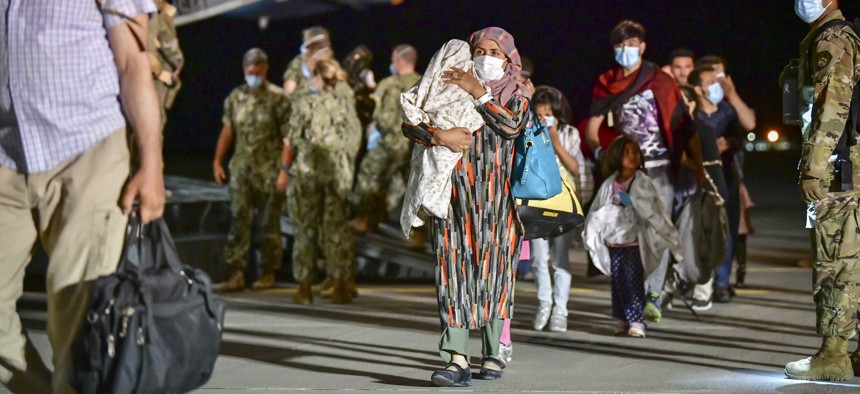
Afghan evacuees disembark a U.S. Air Force C-17 Globemaster III at Naval Air Station Sigonella, Aug. 22, 2021. U.S. Navy / Mass Communication Specialist 1st Class Daniel Young
4 in 5 Afghans Who Worked for the US Have Faced Taliban Threats, Poll Finds
Lawmakers and advocates are working on legislation to make the special immigrant visa program permanent.
More than a quarter of translators who helped the United States military in Afghanistan say they or their family members have faced direct threats from the Taliban within the past month, according to polling data shared with Defense One.
More than 74,000 applicants who worked with the U.S. military or government are in the special immigrant visa pipeline nearly a year after the United States withdrew from Afghanistan, the State Department announced last month. Soren Duggan, the assistant director of advocacy for No One Left Behind, said each Afghan who worked with the U.S. military applies with four-and-a-half family members on average. That means the total number of Afghans who have applied to come to America could be upwards of 300,000 people.
Those people are facing a “grim” security situation, Duggan said. No One Left Behind recently polled 6,500 special immigrant visa applicants who are still outside the United States on what dangers they are facing because of their support of the United States. Just 6.5 percent of respondents in Afghanistan said they are living “securely and safe from harm.” Nearly 64 percent said they are not living safely, and nearly 30 percent they are only safe sometimes.
Applicants and their families are also facing regular direct threats from the Taliban. Nearly 10 percent say they have been directly threatened in the past week, and 26.1 percent have faced threats in the past month. Only about 14 percent say they have never been directly threatened by the Taliban.
Matthew Zeller, senior advisor at Iraq and Afghanistan Veterans of America, is also hearing reports of violence first-hand. On Sunday, an applicant texted Zeller to let him know that the Taliban had killed an interpreter he served with.
“This is happening in real time, it’s not an abstract. It’s actual human beings I’m in contact with who are reporting friends and relatives being killed…or they stop writing back and I find out they themselves have been killed,” Zeller said.
The Special Immigrant Visa program for Afghanistan, which was authorized by the Afghan Allies Protection Act of 2009, enables Afghans who worked with American troops as translators to bring their families to the United States, allowing them to escape threats from the Taliban because of their support of America.
Of the 74,000 principal applicants in the pipeline, more than 16,000 have submitted all the documents required for chief of mission approval, including a verification of employment, letter of recommendation, scanned copies of employment badges, proof of Afghan citizenship, and other required forms, the State Department spokesperson said. For the remaining applicants, the ball is in their court to submit the required documents to continue the application process, the spokesperson added.
Lawmakers and advocates are looking to make the program permanent, to ensure locals who help American troops in future wars are also able to come to safety in the United States. Sen. Jeanne Shaheen, D-N.H., a senior member of both the Senate Armed Services Committee and Senate Foreign Relations Committee, said she’s working on security bipartisan support for legislation to permanently solidify the program.
“When it first started, it was viewed as temporary, but this needs to be a permanent program,” she said, but added, “whether we’ll have text we can get agreement on before the election in November is not clear.”
Shaheen is also urging lawmakers to look at expanding who is eligible for the program, which is currently only open to Afghans and their families who worked for the U.S. government, served as translators for American troops, or performed “sensitive and trusted activities” for American troops, according to the State Department.
“In an effort to try and avoid the opposition from those people who didn’t support the program, it was narrowed fairly significantly. We need to take a broader look now,” Shaheen said. “If someone was working for an NGO with the United States or working for the military, they have been targeted by the Taliban.”
Congress is also already working on another proposal to help Afghans who served with the military, but it’s only for helping those who have already resettled in America. When Afghans came to America, they did so under humanitarian parole, which allows them to legally stay in the country for two years. The Afghan Adjustment Act, which was introduced this week, would provide SIV applicants in the United States with the same path to permanent residency that is provided to refugees.
Some argue that the lengthy SIV application process, which takes 587 days on average, is not good enough when people are actively facing threats. Zeller called for the administration to implement a program similar to Uniting for Ukraine, which allows Ukrainians escaping the war and deteriorating humanitarian conditions to come to the United States for up to two years as long as they have a financial sponsor in America.
“At this point, the SIV program is not going to get the vast majority of Afghans left behind out,” Zeller said. “They’re either going to die of forthcoming famine this winter, or it's only a matter of time before the Taliban hunt them down and kill them all….I fear we have two to three years before the vast majority of these people are dead.”
The State Department tweaked the application process on July 20 to try to speed up the process. Rather than having to file paperwork with both the State Department and U.S. Citizenship and Immigration Services, applicants will only need to work with the State Department. Officials predicted the change would reduce the processing timeline by about a month, but Duggan said it’s too soon to tell if it’s made a difference.
A State Department spokesperson also highlighted other efforts to speed up the process, including increasing by more than 15-fold the number of staff to process applications, and restarting an interview process that stopped because of COVID.
“As a result of these efforts, since the start of the Biden administration through July 31, 2022, we have issued more than 15,000 SIVs to principal applicants and their eligible family members,” the spokesperson said.
Even with the cut to bureaucracy, Afghans are still facing significant difficulties moving through the application process. Applicants must complete an interview at a U.S. embassy prior to being approved, but with the embassy in Kabul closed, Afghans must travel to Pakistan for this critical step, Duggan said. This can create financial and safety problems. Only 4 percent of applicants said they felt safe traveling between provinces in Afghanistan, according to the No One Left Behind poll. And just over 5 percent of applicants said they are earning enough money to support their family.
About 1 in 5 applicants also said they have spent between $5,000 and $10,000 on their application process, including security expenses.







